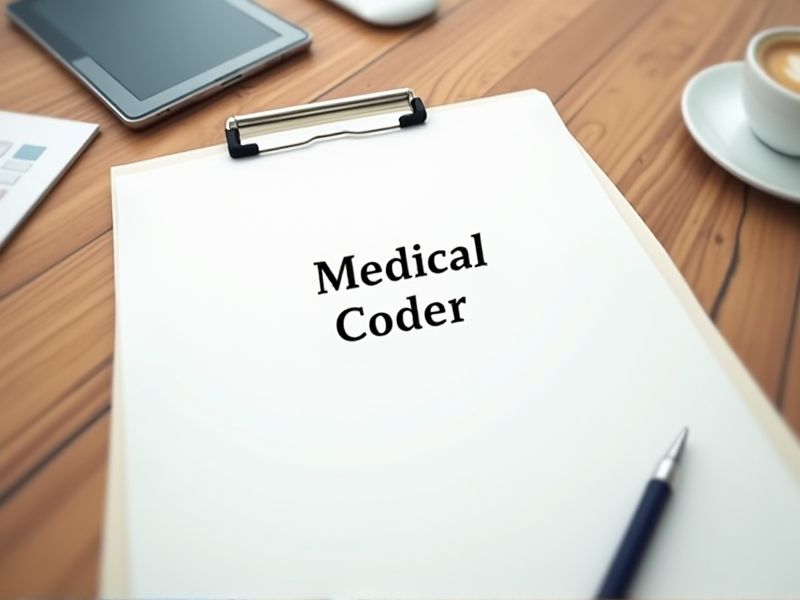
Medical coders serve as crucial links between healthcare providers and insurance companies, ensuring accurate translation of medical services into standardized codes. Possessing certain certifications validates a coder's expertise in coding guidelines and insurance regulations, enhancing job performance and reliability. Certification also opens doors to better job opportunities and career advancement within the healthcare sector. Here are some important certifications a medical coder might need.
Certified Professional Coder (CPC)
The Certified Professional Coder (CPC) credential enhances accuracy in medical coding, reducing errors that can lead to claim denials. Obtaining a CPC demonstrates a coder's proficiency and knowledge of coding systems, increasing employability and potential salary. CPC-certified individuals help healthcare facilities maintain compliance with regulatory standards, minimizing legal risks. Employers often require certification to ensure coders can handle complex medical coding scenarios effectively.
Certified Outpatient Coder (COC)
The certification ensures that medical coders have a comprehensive understanding of outpatient coding systems, which improves accuracy in billing and revenue cycle management. A Certified Outpatient Coder (COC) is necessary to comply with the ever-changing regulatory requirements and maintain coding standards. Having a COC credential can lead to career advancement since healthcare facilities value certified professionals for their expertise. This certification can potentially increase earning potential, as it demonstrates a higher level of proficiency in outpatient coding.
Certified Inpatient Coder (CIC)
The Certified Inpatient Coder (CIC) credential enhances a medical coder's expertise in accurately coding inpatient records, leading to fewer claim denials for healthcare facilities. By obtaining CIC certification, a coder demonstrates proficiency in understanding complex coding guidelines and regulations, which are crucial for compliance with healthcare laws. Hospitals and healthcare organizations often prefer CIC-certified coders to ensure the financial viability of their revenue cycle management. The specialized skills gained from CIC certification result in improved patient data management and quality reporting, aligning with industry standards and benchmarks.
Certified Coding Associate (CCA)
Obtaining the Certified Coding Associate (CCA) credential enhances job prospects for a medical coder due to the validation of entry-level coding skills. This credential serves as a benchmark, ensuring coders meet industry standards. Employers often prioritize candidates with CCAs, which can lead to increased hiring opportunities. Possessing a CCA demonstrates commitment to professional growth and competence in handling medical coding responsibilities.
Certified Coding Specialist (CCS)
Hospitals and healthcare facilities demand Certified Coding Specialists (CCS) because they ensure accurate assignment of medical codes, thereby affecting reimbursement processes and financial health. CCS certification reflects a coder's proficiency in various code sets, minimizing the risk of errors and compliance issues. Expertise of a CCS speeds up the billing process, leading to enhanced cash flow and operational efficiency. A recognized CCS designation often enhances trust from employers and can increase job opportunities, supporting career advancement.
Certified Professional Medical Auditor (CPMA)
The demand for a Certified Professional Medical Auditor (CPMA) in medical coding arises because of the necessity to ensure compliance with healthcare regulations and billing accuracy, reducing the risk of audits and financial penalties. A CPMA's expertise in identifying coding errors supports the enhancement of revenue cycle management by improving claim processing and reimbursement rates. Their skills in auditing medical documentation assist in maintaining data integrity and healthcare service quality. Employing a CPMA fosters a culture of continuous improvement in coding practices, leading to better patient record management and operational efficiency.
Certified Risk Adjustment Coder (CRC)
Certified Risk Adjustment Coders (CRC) enhance coding accuracy, impacting reimbursement calculations for healthcare providers. The presence of CRC-certified professionals ensures proper identification of hierarchical condition categories (HCCs), which influences risk adjustment strategies. CRCs reduce errors, minimizing financial losses related to inaccurate coding and improving the overall audit process. They also ensure compliance with regulatory standards, safeguarding healthcare entities from potential legal ramifications.
Certified Documentation Improvement Practitioner (CDIP)
Certified Documentation Improvement Practitioners (CDIPs) enhance the quality of clinical documentation, directly impacting accurate medical coding and billing processes. Clear and comprehensive documentation ensures medical coders access complete information, reducing coding errors and financial discrepancies. Legal compliance and reimbursement accuracy improve when medical coders work alongside CDIPs. With evolving regulations in healthcare, the expertise of CDIPs helps maintain up-to-date documentation practices.
Certified Medical Reimbursement Specialist (CMRS)
A Certified Medical Reimbursement Specialist (CMRS) ensures accurate billing and maximizes reimbursement for healthcare providers, critical for financial health. This certification provides medical coders with advanced knowledge in insurance regulations, reducing claim denials. CMRSs offer expertise in compliance, minimizing legal risks and protecting the institution. Through specific skills in negotiating with insurance companies, they enhance the efficiency of medical coding operations.
Certified Healthcare Documentation Specialist (CHDS)
A Certified Healthcare Documentation Specialist ensures accuracy in transcribing physician notes, which aids medical coders in assigning the correct codes. This precision reduces errors in patient records, facilitating better healthcare delivery. Accurate documentation from a CHDS leads to efficient insurance claims processing, minimizing reimbursement delays. Their expertise in medical terminology and documentation standards enhances coder proficiency, directly impacting revenue cycle management.
Summary
When you obtain certifications as a Medical Coder, your professional credibility in the healthcare industry enhances. This often leads to increased job opportunities and potentially higher salaries. Employers may view you as more competent and knowledgeable, improving your job security and career progression. Certification can also provide a stronger foundation for mastering complex coding systems and regulations.
